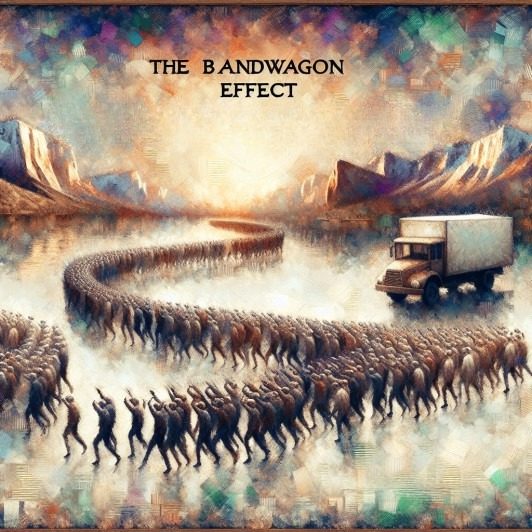Bandwagon Effect Examples: The Masses’ Downfall
Introduction:
Oct 18, 2024
Imagine this: The market is in chaos. Headlines scream about the next big bubble, social media is ablaze with hot takes, and your peers—seasoned investors and amateurs alike—rush to jump on the latest trend. The pressure is palpable, the fear of missing out almost unbearable. You pause, questioning yourself: Am I wrong to stand apart? Or are they all heading for the cliff? This is the power of the bandwagon effect, a psychological force so insidious that it can reduce the sharpest minds to followers and turn the financial markets into a theatre of mass hysteria.
The bandwagon effect is not just the downfall of the reckless—it is the Achilles’ heel of anyone who succumbs to the illusion of safety in numbers. This phenomenon doesn’t discriminate; it drags seasoned investors, corporations, and entire markets into its vortex. When the crowd begins to move, reason is drowned out by momentum, and even the most rational individuals can find themselves swept up in the tide. Yet, as Charlie Munger warns, “The idea of excessive reliance on groupthink is one of the most dangerous and destructive forces in finance.”
Today, we will dissect this phenomenon with surgical precision, bringing real-world examples to light—moments where the bandwagon effect led to financial ruin, herd mentality crushed independent thought, and fortunes were lost to the seductive pull of conformity. At its core, this is a cautionary tale, a challenge to resist the siren song of the masses and embrace the untamed courage of independent analysis.
As we examine these examples, remember that the market rewards those who dare to think differently. Those who succumb to the bandwagon effect may find temporary comfort in numbers, but when the crowd plunges off the cliff, the fall will be just as hard—if not harder. Success in investing is not about following the masses; it’s about stepping back, questioning the consensus, and carving your own path through the storm.
Let us now enter the battlefield of examples, where the bandwagon effect has turned from a seemingly harmless psychological quirk into a catastrophic financial force, leaving a trail of lessons for those bold enough to learn.
The Dot-Com Bubble: A Classic Example of the Bandwagon Effect
The dot-com bubble of the late 1990s is a prime example of how a lack of confidence in traditional market valuation methods can lead to a bandwagon effect. During this period, many investors were swept up in the euphoria surrounding internet companies, disregarded fundamental analysis, and invested heavily in tech stocks with little to no profitability. The fear of missing out (FOMO) on potential gains drove the bandwagon, with investors following the crowd rather than relying on their judgment.
As the bubble grew, the lack of confidence in traditional valuation metrics became more apparent. Investors began to focus on metrics such as “eyeballs” and “click-through rates” rather than profitability or revenue growth. This shift in focus demonstrates how a lack of faith in established market principles can contribute to forming a bandwagon effect. When the bubble eventually burst, many investors who had followed the crowd suffered substantial losses, highlighting the dangers of succumbing to herd mentality without proper due diligence.
Bandwagon Effect Examples: Unraveling The GameStop Frenzy and Social Media Impact
In recent years, the rise of social media has amplified the potential for bandwagon effects in financial markets. The GameStop frenzy of early 2021 exemplifies how a lack of confidence in traditional market dynamics, combined with the power of social media, can create a perfect storm for herd mentality.
During this event, a group of retail investors, coordinating through online forums such as Reddit’s WallStreetBets, collectively invested in GameStop stock to drive its price and squeeze short-sellers. The lack of confidence in the ability of financial institutions and regulators to maintain fair market practices fueled this bandwagon effect. Many investors, driven by a mix of FOMO and a desire to challenge the status quo, jumped on the bandwagon without fully understanding the risks involved.
The GameStop situation highlights how a lack of trust in market structures can contribute to forming a bandwagon effect. When investors believe that the market is rigged against them or that traditional investment strategies are no longer valid, they may be more susceptible to following the crowd, even if it means taking on excessive risk.
The Importance of Independent Thinking and Analysis
Investors must prioritise critical thinking and independent analysis to avoid falling victim to the bandwagon effect. As Socrates championed the examined life, investors should adopt a similar philosophy when making investment decisions. Rather than simply following the crowd, investors should take the time to research and evaluate investments based on their own goals, risk tolerance, and understanding of market fundamentals.
One way to foster independent thinking is to seek out diverse sources of information and opinions. By exposing themselves to various perspectives, investors can better understand market dynamics and potential investment opportunities. This approach can help investors avoid the echo chambers that often form around popular investment ideas and can contribute to the formation of bandwagon effects.
Additionally, investors should be willing to stand apart from the crowd when necessary. This can be challenging, particularly during periods of market euphoria when it seems like everyone else is making money from a particular investment. However, history has repeatedly shown that popularity alone is not a reliable indicator of an investment’s merit. Investors can potentially avoid the pitfalls associated with herd mentality by having the courage to make decisions based on their analysis, even if it means going against the grain.
The Role of Emotional Discipline in Avoiding the Bandwagon Effect
Another critical aspect of avoiding the bandwagon effect is maintaining emotional discipline. The fear of missing out and the desire to conform to the crowd can be powerful emotional drivers that lead investors to make irrational decisions. By developing a strong sense of emotional discipline, investors can better resist the urge to follow the herd and stick to their investment strategies.
One way to cultivate emotional discipline is to have a clear, well-defined investment plan. This plan should outline investment goals, risk tolerance, and the strategies that will be used to achieve those goals. By having a roadmap, investors can be less susceptible to the emotional swings that often accompany market volatility and the emergence of popular investment trends.
Mindfulness and self-awareness can help investors recognize when the bandwagon effect influences them. By taking a step back and objectively assessing their investment decisions, investors can determine whether they are acting based on sound analysis or simply following the crowd.
Conclusion: Bandwagon Effect Examples
The bandwagon effect, driven by a lack of confidence in markets, can have significant consequences for investors who succumb to herd mentality. By understanding the situations that describe this phenomenon, such as the dot-com bubble and the GameStop frenzy, investors can be better prepared to avoid the pitfalls of following the crowd.
To navigate these challenges, investors must prioritize independent thinking, analysis, and emotional discipline. By conducting research, seeking out diverse perspectives, and having the courage to stand apart from the crowd when necessary, investors can make more informed decisions that align with their individual goals and risk tolerance.
Ultimately, the power of investing lies not just in the ability to identify profitable opportunities but also in the capacity to resist the siren call of the bandwagon effect. By staying true to their convictions and maintaining a long-term perspective, investors can weather market upheavals and emerge stronger on the other side.











